Release date: 22nd February 2019
CD & Cassette – 8 tracks – 52 minutes
All tracks composed by Simon Scott
Strings played by Charlie Campagna & Zachary Paul
Artwork & photography by Jon Wozencroft
Mastered by Denis Blackham
Track listing:
1. Hodos
2. Sakura
3. Santori
4. Mae
5. Grace
6. Nigh
7. Baaval
8. Apricity
You can listen to an extract from the album here:
*Additional 20 minute bonus track features a live recording from the Jazz Café in London in October 2018
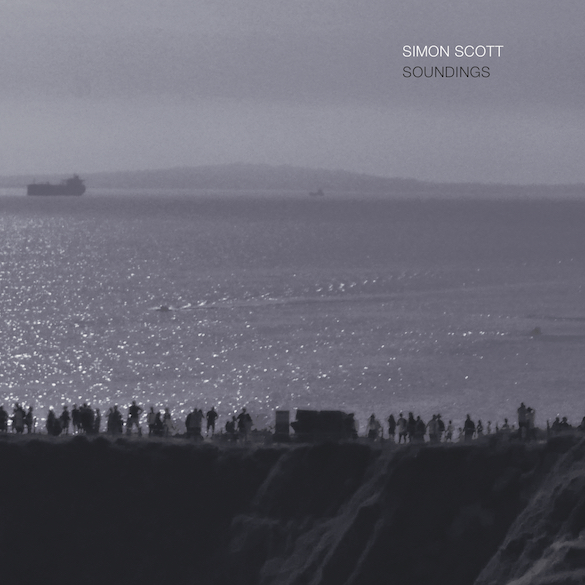
Soundings, his debut studio album for Touch (he previously released the live album Floodlinesi n 2016 and re-issued Below Sea Level in 2017), finds Simon Scott, the composer and sound ecologist, using field recordings from various cities around the globe; modular synthesiser treatments; live strings and laptop electronics to create an album of transition and shifting time zones. The recordings were edited and composed in hotel rooms across the world as Scott was constantly on tour as the drummer for Slowdive, who successfully reformed in 2014.
‘Hodos,’ the album opener, begins with 85 mph Storm Barney recordings, ending with the fading sounds of bellbirds and cicadas recorded in Brisbane 2018. ‘I took a home recording I made of Storm Barney in Cambridge, listening to it on repeat when I was flying from continent to continent. I wanted this to be the starting point of the process of musically documenting how much travelling I was doing’. This album was created from the US to Asia, South America to Europe and the Arctic Circle back to the UK via California. ‘Working in hotel rooms and on flights, listening to and editing the recordings I’d made from all of these distant cities formed the basis of the album. It’s the soundtrack to four years of my life in flux with constant change, jet lag, excitement and the seeming perpetual motion of travelling’.
The cassette version features an extended 60 minute version of the album remastered by Scott.
Reviews:
somewhere cold (net):
A prolific composer and consistently incredible sound-smith, Simon Scott has been putting out experimental music for a decade now. Yes, it is that Simon Scott, the rhythmic god who pounds the skins in the glittering progressive band Slowdive. Soundings is his newest album with 52 minutes of music combining field recordings, live strings, synthesisers, and soft synths created as he travelled across the globe touring with Slow dive. Recordings stretching over the course of four years, Scott records and produces a soundtrack to his meandering years on tour and all that means.
Soundings begins with field recordings on ‘Hodos’ which give the album’s beginning an organic feel. Sting voices peer here and there among the shadowy and fuzzy tumult, while more effulgent strings begin to hum, giving a floor to the piece. There is a patience to the opener, allowing the listener to soak in the subtleness of the moment. What sounds like birds punctuates, ever so slightly, the sonic landscape, giving this piece a living population. ‘Sakura’ follows with an opening synthtone and bright, melodic notes. The dance of the synths becomes more intricate and then water flows as the centrepiece of that moment. As the water fades, the synths once again dance alone, sparkling in the foreground.
‘Santori’ begins seamlessly as a subdued beat punctuates the air and deep, abiding strings ring out. A slight crackle fills the mix, giving a hint of aural texture. Vibrating electronic tones move and slide between speakers as they ungulate. There is an almost deep, beautiful mournfulness to this composition which moves the listener into a melancholic state.
‘Mae’ has whirling, looped synths that pour over and over one another as they circulate and then give way to more metallic and harsher tones. Birds re-appear here, grounding the track as strings take over and great a sonic river of aural light. As ‘Mae’ fades, ‘Grace’ arises and is textually quite different in its beginnings. Almost like the metallic rubbing of a vibrating guitar string, the tone is vibratory. It is accompanied by beautiful synth tones that feel like deep pools of refreshing water and the strings slide about, creating ease and contemplative moments. ‘Nigh’ is meditative and hypnotic from the start. Dreamy synths and strings populate the piece as panning gives the sounds a glacial movement while deepening the textural choices.
‘Baaval’ is a more ephemeral piece with a deep core tone that reverberates out into a fuzzier texture. It begins a grouping of longer pieces at the end of the album. This piece is simple on the surface but increases in depth with every listen. Again, birds chirp, tying the track with former pieces. The synth work here is subtle but engaging. ‘Apricity’ ends the studio tracks on the album and it begins with a deep, flowing tone. Textural accents flow in and out of the mix and incredibly subtle strings ebb and flow. This long form piece, clocking in at over 15 minutes, is a slow and radiant build, like high tide slowly moving in to meet the shore. The strings become fuller as the track progresses and the different variations move in and out of focus. The strings eventually fade or perhaps become a part of a larger, vibrating synth drone. The final track to the album is a live piece which is over 20 minutes long and was recorded at The Jazz Café. The piece is expertly executed and fits well with the tonality of the rest of the album. In fact, It is the perfect finale to the album, graceful and profoundly moving.
Simon Scott’s Soundings is a brilliant set of tracks that demonstrates his ability to mix subtlety with depth. This is over 52 minutes of engaging, ethereal ambience that evoke open spaces and the wandering of Scott’s last four years. I highly recommend picking up a copy of Soundings as well as diving into all of Simon Scott’s back catalog. [Jason]
Fluid Radio (UK):
The field recordings on Soundings light up the music and the world. Taken from cities around the globe, and using modular synths, strings, and laptop electronics, the recordings aid in creating music of transition and transience, shifting into many different time zones throughout its trek. Edited and composed in hotel rooms at a time when Simon Scott was on tour as the drummer for Slow dive, Soundings features 85mph winds, bellbirds, and cicadas in the first track alone, moving from its British beginnings (the winds of Storm Barney, which terrorised the UK and which unfortunately wasn’t named after a huge purple dinosaur) to Australia’s Brisbane. In the space of a single track, Scott’s music faces a long haul flight. Although it’s physically demanding, the recording offers an easy ride. Two sides of the world and two different continents are united in one recording, despite travelling a huge distance. As such, Soundings is a travel document and a sonic passport.
‘I took a home recording I made of Storm Barney in Cambridge, listening to it on repeat when I was flying from continent to continent. I wanted this to be the starting point of the process of musically documenting how much travelling I was doing. It’s the soundtrack to four years of my life in flux with constant change, jet lag, excitement and the seeming perpetual motion of travelling’.
Scott’s music lags without fatigue as it sails through the sky. From the USA to Asia, South America to Europe, the Arctic Circle to the UK (and with a stop in California on the way back), Soundings travels vast distances, picking up the flavours and the vibes of each place while infusing the entire album with a delicate understanding of many differing cultures and scents. Early-to-rise tones and sleepy, dusk-hidden melodies pepper the tracks, but they have an airy feel to them, high in their altitudes. The long drones never really touch down, but only vaguely circle and skirt the outlines of a city. Jet-lagged drones and darker tones gaze upon a midnight city, its glowing lights replacing the sun, its downtown twinkling like a cluster of fallen stars.
Scott’s brief stay offers an intermittent glimpse, a passing through; the music feels intentionally incomplete, or transient, in spite of it being a completed and refined work. Scott is able to bottle the journey within his tired ambient tones and electronic oscillations – which thrum against the drone and shudder like the dropping of a landing gear. The long drones of Apricity cruise in the sky, its strings imperceptibly morphing into something more electronic as they make their way home. The exhaustion and euphoria of touring is here, but, as always, the journey is more important than the final destination. [James Catchpole]
A Closer Listen (USA):
Where were you when Slowdive was formed back in 1989? NOT BORN YET?!! Thanks a lot, you’ve just made Simon Scott and I feel old. But there’s a huge difference between old and irrelevant and old and vital, and Scott lands firmly on the latter side. Although he’s shifted styles a number of times, he’s never stopped composing or performing. Soundings was recorded during four years of touring with his re-formed band. The album is the product of ‘a life in flux … constant change and jet lag … hotel rooms, flights and distant cities’. As such, it feels disconnected with land, often touching down but with the knowledge it will not be able to stay too long.
The first field recording is the best, and most obvious: 85mph winds from Hurricane Barney, whipping up a storm expressed here in a morass of strings. These strings, played by Charlie Campagna & Zachary Paul, are a constant presence throughout the album, but in ‘Hodos’ they sound foreboding, the cello unable to escape the churn. The bellbirds and cicadas that close the piece are not from the storm, but from the safety of Brisbane, many moons later and half a world away, offering evidence that we carry our memories with us and they blur in collision with other experiences. Scott would get as far as the Arctic Circle, an ironic mention given the fact that a famous explorer who shares his surname would perish while returning from Antarctica.
Scott’s wandering synth and electronics echo his own journey, providing few signposts along the way. The tracks drift together like sheets of polar ice. One would think the setup would preclude a single, but there’s actually one included here: the streaming edit of ‘Grace,’ which Scott released in full as an 18-minute track back in August. In our opinion, the album’s only miscalculation is that at 52 minutes, the album had room to include the full composition. Scott opted instead to offer a 20-minute live track as a bonus cut, while extending the mix to 60 minutes for the cassette. But don’t despair, fans of long music; the album closes with its best track, the quarter-hour ‘Apricity’.
On ‘Apricity,’ all the threads come together. The length of the piece allows one to surrender to the flow of time, an important nuance as the album references the challenge of traveling between different time zones. While listening to ‘Apricity,’ one feels a sense of drifting, falling (to quote The Ocean Blue’s 1989 hit). More importantly, one also gets a feeling of coming home, of finally being able to rest, of knowing that one is safe, the ground firm and stable beneath one’s bed. This beautiful, archaic word is defined as ‘the warmth of the sun in winter,’ which lends itself to a wider interpretation: we feel the warmth of home, even when we are away. Somewhere in Cambridge, world tour complete, Scott is enjoying this reassurance. [Richard Allen]
Exclaim (Canada):
Described by the artist as a kind of travelogue, gathered, edited, composed and considered over a four-year period that included the reunion and tour of his ’90s band, Slowdive, Simon Scott delivers an appropriately dislocated collection of soundscapes that are dizzying in their swings between blurred acceleration and detailed stillness.
Opener ‘Hodos’ serves as introduction and précis key to the album, with a field recording of 140 km winds from a storm in Cambridge that eventually cedes to cicadas recorded much later in Brisbane. The piece is laced together by a drift of strings from Charlie Campagna and Zachary Paul, who reappear throughout the album.
One of Scott’s gifts is combining layers of tone, noise and faint melody into loops whose duration and repetition invite contemplation, but with a slight uneasiness that subtly dislodges any such attempt – kind of anti-meditative meditation music.
Both ‘Baaval,’ and ‘Apricity,’ the two longer pieces that close the album, have a blend of grace and self-doubt, the former especially in its slightly off-centre drone that gives way to an open window onto nature and out of claustrophobia.
All in all, this is a masterful summary of the far withouts and deep withins from Scott’s period of perpetual motion. [Eric Hill]
Rockerilla (Italy):
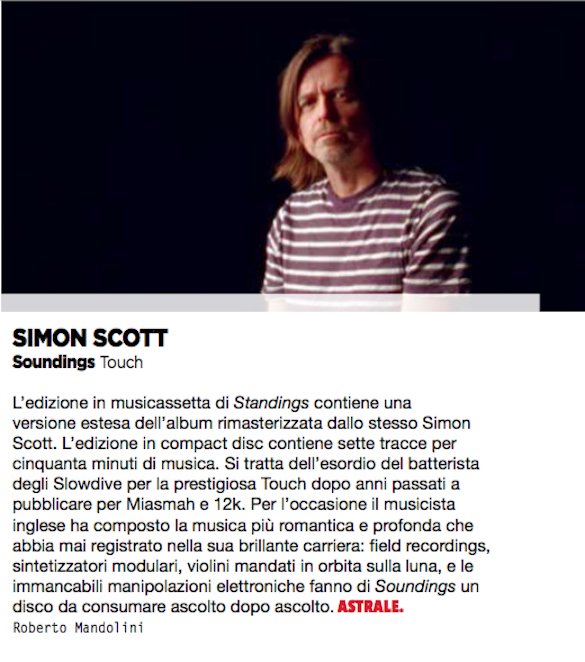
Sonic Seducer (Germany):
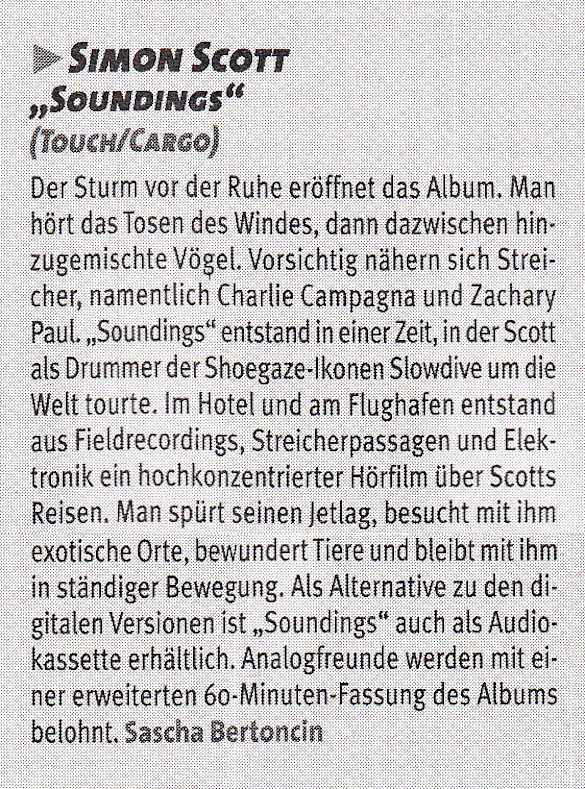
Ondarock (Italy):
Dietro la leggenda shoegaze degli Slowdive sembrano celarsi pulsioni espressive parecchio lontane dalla fragorosa e sognante corrente novantiana: da un lato abbiamo Neil Halstead, avvezzo a intimismi folk contemporanei, più imparentati col fingerpicking che col tradizionale cantautorato albionico; dall’altro il batterista Simon Scott, affascinato dalle dilatazioni melodiche dell’ambient music e dalle sue recenti confluenze nella sfera neoclassica.
Dopo varie incursioni con etichette tra cui Miasmah e 12k, Scott rientra nella produzione a marchio Touch, che tre anni fa ne incluse una registrazione live al Cafe Oto nella serie ‘Tone’ (Floodlines, 2016). Il recente ingresso delle emergenti Bethan Kellough e Claire M Singer ha aperto ulteriormente la strada a una poetica come quella di Soundings, che come si evince sin dai primi istanti è ‘cucito’ intorno a field recordings raccolti in giro per il mondo. È il diario in forma astratta di quattro anni in costante movimento, a motivo della fortunata reunion della band, e di fatto una collezione di quiete parentesi ritagliate in stanze d’albergo sparse tra i continenti.
Si direbbe il tentativo di ristabilire un contatto con la schietta tangibilità del reale, benché tale anelito vada di pari passo con rimaneggiamenti al synth modulare e con un’armonizzazione strumentale affidata agli archi di Charlie Campagna e Zachary Paul, le cui traiettorie ondeggiano attorno al bordone portante con la stessa imperturbabile cadenza.
A tratti dimessa e malinconica, in altri trasognata e confortante, la fusione tra elettronica e acustica di Soundings evoca le produzioni finali degli Stars Of The Lid e le estasi cameristiche del compianto Jóhann Jóhannsson, invitando la mente a un viaggio che, anche a motivo di passaggi decisamente bruschi, ha come condizione la nostra presenza mentale ed emotiva affinché non diventi un ennesimo sottofondo funzionale alla concentrazione su altre e più trascurabili faccende quotidiane. [Michele Palozzo]
Toneshift (USA):
This is as if I have really begun to hear the work of Simon Scott for the very first time – even after listening to his work over a good part of the 2010’s, since Below Sea Level(12K, 2012). Soundings (out on 2/22) is a different approach to flash-fusing field recordings and electronic music, both sensitive and flowy, without bearing into invisibility. For many an artist who creates layered ambient work, such is the problem of allowing work to wither away and far from memory. Soundings is a deeply developed collection of nine shorter pieces that all folds into a nearly hour-long work of emotionally fatigued harmonies, the cassette version runs for nearly eight minutes longer for those with decks. The work materialises into something moody and narrative with drones and strings, electronics and sounds from his surroundings as he travelled.
While ‘Hodos‘, ‘Sakura‘ and ‘Santori‘ all blended so aqueously together, ‘Mae‘ takes off in a slightly different path, one that has an unveiled industrial side. Scott recounted:-
‘I took a home recording I made of Storm Barney in Cambridge, listening to it on repeat when I was flying from continent to continent. I wanted this to be the starting point of the process of musically documenting how much traveling I was doing.’
The listener will be grateful for his lengthy journeys given the stealthy result that offer both the tender and the vascillating psyche, documenting the experience in the US to Asia, South America to Europe and the Arctic Circle and back to the UK. Travel, in and of itself, can be draining to us all, and he’s managed to capture the passage, the road and the physical wear/tear to an extent.
There are purely harmonic moments of splendour throughout both ‘Grace’ and ‘Nigh‘, where Scott looks upwards toward the heavens, or perhaps recalls the act of dangling in the sky between destinations. It’s all warm and free. On ‘Baaval’ the paler shades begin to darken at the edges and start to run rings. A sense of apprehension is palpable in this watery mix of bass drone and minimal harmonic mutation. From this bloated vibration comes the vague chirping of exotic birds at more than twenty paces.
This was the perfect staging for the daunting outcomes via ‘Apricity’, the final track here. The bass is super low, muted, almost white-noise like, however with each cycle Scott manages to add the lightest hint of stringed harmony, exquisitely played by Charlie Campagna & Zachary Paul. This fifteen-minute plus closer has ample time to indulge in the previously foreshadowed travelogue of foibles and faultlines, and does so in a way you might imagine to delivered by a full orchestra. There is a relentless spirit moving forward on this record, and though it uncovers some fairly expected sweet spots here and there, the man behind it manages to come from behind its many layers to demonstrate a realised vision. [TJ Norris]
Das Filter (Germany):
Simon Scott ist weit mehr als der Schlagzeuger von Slowdive. Filter-Menschen wissen das sowieso, spätestens aber seit dem vergangenen Sommer, als ich hier schon mal seine Musik feierte. Nun hat er ein Album für Touch aufgenommen, sein erstes richtiges, also jenseits von Live-Aufnahmen und Re-issues. Die Geschichte ist wieder mit Slowdive verknüpft – irgendwie zumindest. Denn Scott nahm diese Platte (gibt es auch auf Tape! – mit Bonus-Material!) rund um den Globus auf, meist im Flugzeug oder im Hotel. So verdichteten sich Schritt für Schritt die Ideen zu fertigen Tracks, während er von A nach B flog, auf den Soundcheck wartete oder erschöpft an einem freien Tag im Hotel langsam wieder runterkam. Man kann dieses Album als eine Art Reise-Tagebuch hören – einen Einblick in vier Jahre Simon Scott. Denn genau so lange hat er an den Stücken gearbeitet. Vielleicht ist das genau die richtige Brille, denn so fügen sich die oft skizzenhaft wirkenden Arbeiten zu einem starken Bild der Seele eines Musikers zusammen, der rastlos durch die Welt geschickt wird, ein zwar wichtiges, aber eben nur ein Rädchen einer größeren Maschinerie ist, die, wenn sie einmal rollt, nicht aufzuhalten ist. Die Stücke sind eine Art Gegenentwurf zu dieser Schnelligkeit. Manchmal fast schon flüchtig, manchmal umso stärker und fordernder. [Thaddeus]
Groove (Germany):
Von der Überwältigungsästhetik des Indie-Rockkonzerts zur gesteigerten individuellen Hörwahrnehmung in der Stille muss der Weg gar nicht weit sein. Manchmal kommen sie sogar in einer Person oder einer Gruppe zusammen. Eine Shoegaze-Band wie ‘Slowdive’ verkörpert deftige Lautstärke ebenso wie Subtilität und Detailreichtum in der klanglichen Textur. Simon Scott, Drummer der mit Unterbrechungen seit den späten achtziger Jahren aktiven Band, ist als Solokünstler zum enthusiastischen Parteigänger der Sound-Ökologie geworden, einer Leidenschaft für das tiefen Hören von Räumen, Orten und Situationen, dem auslegen und verfolgen subtiler akustischer Spuren. ‘Below Sea Level’, Scotts erstes Album mit bearbeiteten Naturaufnahmen von 2012, war in dieser Hinsicht wegweisend. Ultraleise und intensiv, fast nichts zu hören und doch Dokument eines ganzen Universums. Schon bei dieser Arbeit wurde klar, dass Scott die Sound-Ökologie nicht orthodox interpretiert. Seine Feldaufnahmen aus einer sehr stillen Natur waren digital manipuliert zu leisest möglichem Ambient geworden. Scotts neues Album Soundings (Touch) geht in der modernen Auslegung der klanglichen Ökosysteme noch weiter. Die Tracks fußen zwar alle in Field Recordings, haben aber eher urbanen Charakter, sind von Hotelzimmerkaustik und Musikreproduktion geprägt. Umspielt von Modularsynthesizerklängen und Streichern sind sie zu etwas geworden, dass sich perfekt in den engen Zwischenraum von dynamisch gespieltem Song und statisch arrangiertem Track schmiegt. Mit diesem Album könnte Scott vielleicht sogar den Erfolg seiner Band einholen, ihre Qualität hat er schon lange.
Blow Up (Italy):
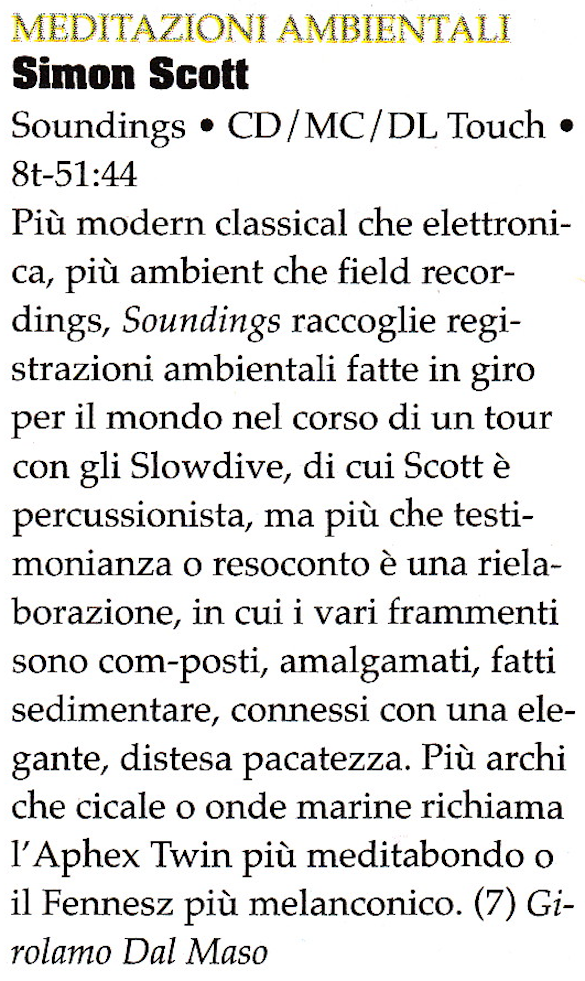
Brainwashed (USA):
This is Simon Scott’s formal debut for Touch and it is such a quintessential example of the label’s aesthetic that it almost feels like a homecoming. It is similar to a homecoming in another way as well, as Scott composed these pieces from field recordings taken during Slowdive’s extensive touring over the last few years, diligently editing and shaping them in hotel rooms during his idle hours. Upon returning, he teamed up with cellist Charlie Campagna and violinist Zachary Paul to transform his impressionistic audio diaries into a lushly beautiful and bittersweet ambient travelogue of sorts. In some ways, this side of Scott’s work is less distinctive than his more dub-inflected albums, but he has a remarkably great ear for striking the perfect balance between vibrant textures and blurred, dreamlike elegance.
Slowdive’s reunion touring led them to a lot of interesting and far-flung locales, but the most striking field recordings that made it onto this album originate from Brisbane, where Scott captured the sounds of a furious wind storm. Those crashing waves and fleeing birds appear prominently in the opening ‘Hodos,’ which is Soundings most striking and evocative marriage of nature and artifice. That is not say that it is necessarily the album’s strongest piece, but it is quite a beautiful one, as blossoming dark clouds of brooding strings slowly move across a battered shoreline. The way the spraying whitecaps and the languorously moaning strings interact feels quite organic, natural, and seamlessly intuitive, yet Scott’s light touch works so beautifully because he was handed such a wonderful gift: the vibrant and visceral crash of the surf does a hell of a lot of the heavy lifting on its own. On the album’s other pieces, the focus is necessarily more on Scott’s own contributions (apocalyptic storms were apparently not a common occurrence on the tour).
Most of my favourite pieces fall near the end of the album, but not quite all of them, as the success of ‘Hodos’ is followed by another gem in ‘Sakura’. I am guessing that the gently babbling stream that surfaces in the piece was located somewhere in Japan, but Scott is quite sparing with the background details, largely limiting his contextual clues to the one-word song titles alone. There is a certain logic to that decision, as ‘Hodos’ is the only piece on Soundings where nature has truly earned equal billing. With ‘Sakura,’ the beauty originates almost entirely from Scott himself, as the piece unfolds as a flickering and dreamlike reverie of processed guitar sheen.
The album’s second (and more sustained) hot streak starts to cohere a few songs later with ‘Mae,’ a lazily churning and sizzling drone piece that gradually gives way to a quiet coda of happily chirping birds. Once that avian chorus takes their leave, the album blossoms into a thing of truly sublime beauty with the two pieces that follow: ‘Grace’ and ‘Nigh’. On ‘Grace,’ a warm and gently undulating haze of strings twists and drifts across a landscape of shivering and shuddering chord swells. It is an absolutely rapturous piece of music, but ‘Nigh’ is even better still, cohering into a sun-dappled and lovely procession of chord swells mingled with swooning violin melodies and a dreamlike nimbus of subdued flutter and hiss.
For me, those two pieces are the true beating heart and emotional core of the album, but Scott saves a couple of other strong ideas for the album’s final act. I am guessing that ‘Baaval’ originated in either Moscow or the Arctic Circle, as both were among Scott’s stated recording locations and it is initially a very dark and cold-sounding piece, evoking a windswept expanse of frozen wasteland. By the end, however, it warms into something approaching a sort of precarious radiance, like a faint sunrise chasing away some of the more menacing shadows. That piece gives way to the album’s slow-burning closing epic, the 15-minute ‘Apricity.’ For the most part, it marks a warm and lushly beautiful return the terrain of ‘Nigh,’ as rich, slow-moving chord swells surge beneath a lovely and lyrical violin melody. As a result, ‘Apricity’ initially seems poised to be the album’s crown jewel, but it takes a curious detour around the nine-minute mark and rides out its final third as kind of a locked-groove of gently pulsing, pastoral ambient music.
I am admittedly a bit perplexed as to why Scott chose to dilute one of his strongest pieces in that fashion, as well as end the album on such a comparatively forgettable note. Artists sure can be inscrutable sometimes. Still, it is not nearly enough of a wobble to derail an otherwise excellent album. Soundings is a curious sort of excellent album, however, wonderfully exceeding my expectations some moments and leaving me scratching my head during others. For example, the very restrained and subtle use of field recordings for much of the album feels like an exasperating missed opportunity to me, as Scott could probably have gotten all of the same recognizable sounds without ever leaving southern California. There is nothing among the bird and water recordings that distinctively call to mind Peru, Tokyo, or Moscow, even though Scott recorded in all those places.
On another level, however, that decision is actually kind of cool, as Scott eschewed the easy and obvious path to make something considerably more elusive and abstract: a record of his own impressions during a sometimes beautiful, sometimes lonely, sometimes disorienting adventure through many of the great cities of the world. As such, Soundings is a dreamlike procession of elusive individual moments brought to vivid life. Granted, it is easy to imagine a more evocative, richly textured, and immersive album that might have resulted if Scott had taken a more straightforward path, but that album does not exist. This album, however, does exist and it is often an achingly lovely and poignant one. [Anthony d’amici]
Loop (Chile):
Artista sonoro, compositor, multi-instrumentista y baterista de la reformada banda Slowdive, Simon Scott saca su nuevo álbum de estudio, después de Floodlines (grabación en vivo, 2016) y la reedición de Below Sea Level (2017).
Soundings incluye arreglos con sintetizadores modulares, laptop, secciones de cuerda en vivo y grabaciones de campo que compuso y editó en las habitaciones de hoteles en distintas partes del mundo, mientras Slowdive se encontraba de gira por Estados Unidos, Sudamérica, Europa, el Círculo Ártico y en el Reino Unido.
Este álbum según Scott es la banda sonora de cuatros años de su vida, en un flujo constante de cambios, de horarios y el vertiginoso movimiento de los viajes.
Soundings son ocho composiciones ambient cuyas líneas de sintetizador atmósféricas y los bellos acordes de las cuerdas, le dan un carácter expansivo que invitan a dejarse llevar por la imaginación. Las grabaciones de campo de tormenta, pájaros e insectos le ponen la nota de realidad que remite al medio ambiente de alguna parte del mundo.
Por un lado están las composiciones con acercamientos a lo clásico (‘Santori’, ‘Grace’ y ‘Nigh’) y por otro, a la experimentación electrónica como en ‘Hodos,’ ‘Mae’ y ‘Baaval’.
Cierra este álbum ‘Apricity’, del que emergen lentamente líneas nostágicas de pura fragilidad y belleza.
Scott realiza un disco de gran factura con cuidadosos arreglos que muestran su incuestionable sensibilidad. [Guillermo Escudero]
Art Noir (Switzerland):
Es beginnt mit dem Meeresrauschen, so weit so klischeehaft. Denn die Geräusche, denen man bei Feldaufnahmen am meisten in der Musik begegnet, sind bestimmt die See, Vogelgezwitscher und das Knistern des Lagerfeuers. Simon Scott, welcher während eines Grossteiles seiner Zeit als Schlagzeuger von Slowdive durch die Welt reist, tappt aber nicht in die Fallen der plakativen Ewigkeit, sondern vermengt auf Soundings seine eigenen Ambient-Drones mit Klangaufnahmen aus aller Welt zu hübschen Neufindungen.
Ja, bei ‘Mae’ hört man Vögel, und auch die menschliche Stimme sucht sich ab und zu ihren Weg auf ‘Soundings’. Doch alles wird von Simon Scott geschickt abgewogen, mit melancholischen Streichern versehen, von dröhnenden Synthesizern unterwandert. Das Album ist ein Versuch, aus dem rastlosen Tourleben einen Sinn zu destillieren, aus den unsäglichen Wechseln eine Konstante zu produzieren. Mit viel Geduld, Konzentration und dem Fokus auf einzelne Details. Ein Reisetagebuch der anderen Form also, persönlich und doch global.
Und wie geschickt Simon Scott dabei vorgegangen ist, das merkt man, wenn man erfährt, dass ‘Hodos’ nicht am schönen Strand, sondern mitten in einem Sturm in Cambridge aufgenommen wurde. ‘Soundings’ ist ein Werk, das mit der Wahrnehmung spielt und viele Überraschungen in sich trägt. Bis am Ende mit dem langen ‘Apricity’ die Erhabenheit überwiegt und nicht nur die Seele des Künstlers beruhigt. Das Ziel ist erreicht. [Michael Bohli]
Etherreal (France):
Installé chez Touch depuis 2016 (ces pages s’étaient fait l’écho de album Floodlines livesuivi d’une ressortie de Below Sea Level), Simon Scott semble s’y trouver à la bonne place puisque l’Anglais y propose, avec Soundings, un disque entre ambient et field recordings. En effet, profitant d’une sorte de tour du monde réalisé avec Slowdive (dont il tient la batterie) en 2014 lors de la reformation du groupe, le musicien a capté des sons et des enregistrements un peu partout avant d’y ajouter quelques instruments réels.
C’est ainsi qu’une guitare électrique saturée vient placer ses traits sur les nappes extérieures (‘Mae‘) ou que, dans un registre nettement moins éclatant, les cordes de Charlie Campagna et Zachary Paul enrobent avec suavité les textures du Britannique (‘Nigh’). Alors qu’on craignait un peu (et les premières minutes ne font rien pour écarter ce léger scepticisme) que Simon Scott limite un peu son intervention à un simple pressage de la fonction « rec » de ses machines, ses apports instrumentaux viennent conférer une dimension toute autre, nettement plus riche.
Au surplus, plus le disque avance, plus la longueur des morceaux s’allonge, partant d’environ quatre minutes pour terminer au-delà du quart d’heure. Comme souvent avec pareil registre, le musicien trouve évidemment matière à déployer son propos avec cette durée étendue. Quelques bruissements et crépitations continuent de s’entendre, reflets des captations réalisées de par le monde, mais l’adjonction des cordes, des accords de synthé, de rythmiques un peu lointaines et autres traitements permettent d’aller vers des contrées plus riches encore. [Francois Bousguet]
Dark Entries (Belgium):
Naast drummer voor de in 2014 herrezen shoegaze cultband Slowdive (eerder actief van 1989 tot 1995) is Simon Scott een multi-instrumentalist en geluidskunstenaar. Inspiratie en interesses haalt hij uit klankecologie, digitale media, compositie, geluidskunst en muziektechnologie. Hij bracht eerder al een aantal albums uit waaronder zijn debuut Navigare (2009), Below Sea Level (2012) en in 2015 Insomni. Vanuit zijn woonplaats Cambridge vertrok hij dan op wereldreis. Een tocht die hem van Australië naar de Verenigde Staten bracht, dan via Azië en Zuid-Amerika naar Europa, om na een ommetje naar de poolcirkel terug te reizen naar het Verenigd Koninkrijk. De componist in hem zorgde ervoor dat hij naast opnames van thuis, zijn reizen van continent naar continent wist te documenteren met allerlei veldopnames. In hotelkamers en in vliegtuigen nam hij de tijd om naar alles te luisteren en die registraties naderhand ook te bewerken.
Het is de soundtrack geworden van vier jaar uit het leven van Simon. De composities met als vertrekpunt omgevings- en natuurlijke geluiden zijn zowel blootgesteld aan modulair bewerkte synthesizer handelingen als digitaal gemanipuleerd. Scott maakte ook gebruik van organische, akoestische texturen en strijkinstrumenten. Soundings is een verzameling van zeer minimalistisch opgevatte miniaturen die een beeld schetsen van de natuurlijke wereld wiens geluiden door middel van moderne technieken worden omgezet in een bezielende en belangwekkende muzikale beleving. [Paul Van de gehuchte]
Rockerilla (Italy):
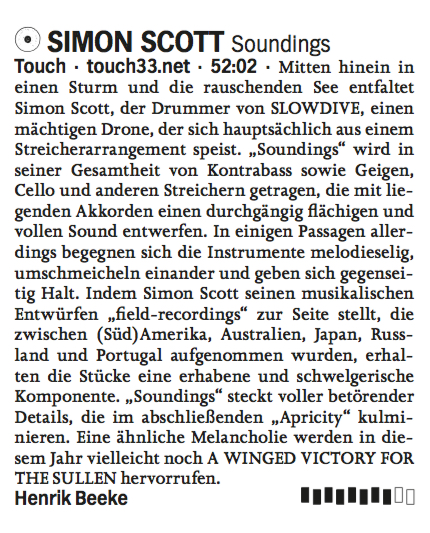
Chain D.L.K. (USA):
This new release from Simon Scott, already known as Slowdive drummer, is presented as a collection of tracks composed in a four years time span so the field recordings are not a sound make up to give a sense of reality to electronic music, but a temporal tag which link the track to the place, and time, where it was conceived.
The recordings of Storm Barney open ‘Hodos’ and introduce the listener towards a concept of music where field recordings and electronic music, mostly drone based, merge in a cohesive whole. ‘Sakura’ is a melancholic track based on resonances upon the sound of flowing water. ‘Santori’ has an almost dramatic tension while ‘Mae’ has moments with impressive sound masses. ‘Grace’ and ‘Nigh’ borders modern classical territories with their catchy melodies on strings. ‘Baaval’ is instead a drone interlude to ‘Apricity,’ the longest track of this release, where the long tones on strings evolves until they obtain a lyrical force which could be a little too sentimental but of great impact.
An example or organic ambient music which could not have those elements of originality that could charm the listener at first sight but whose impressive craft for harmony and variety will give a lasting place below the laser lens of the player. A really nice release.
Bad Alchemy (Germany):
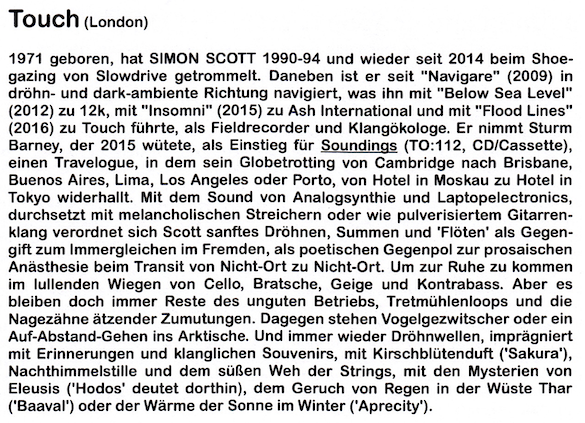
Rockdeluxe (Italy):
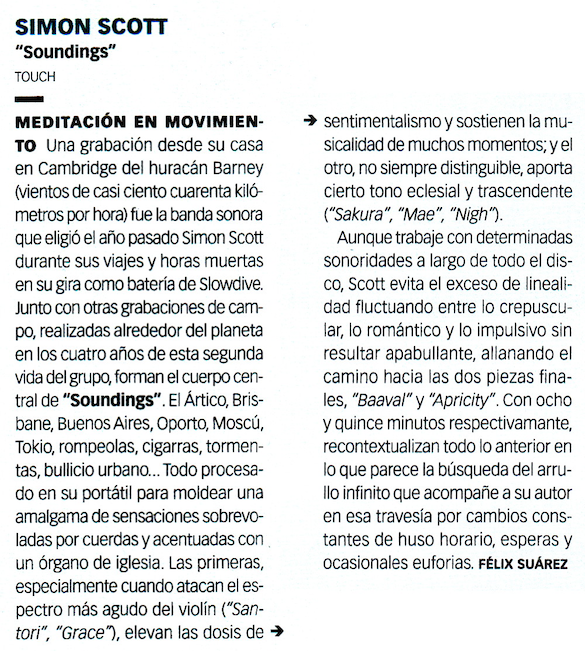
A Closer Listen (USA):
Top ten drone albums 2019
In Western cultures, people who are calm can get a bad name: if they’re one step away from serene one moment, some reason, they may be two steps from erupting the next. Soundings, Slowdive drummer Simon Scott’s debut studio album for Touch, has a monk-like pulse with no signs of snapping. Gone is the drum kit and 4/4 beats of his mainstay band. Instead, Simon’s electro-acoustic suite mulches field recordings from his global travels alongside dustings of live strings and modular synths. It all lingers calmly in a jetlag haze – a traveller’s sleepy wonderment. [Todd B. Gruel]










